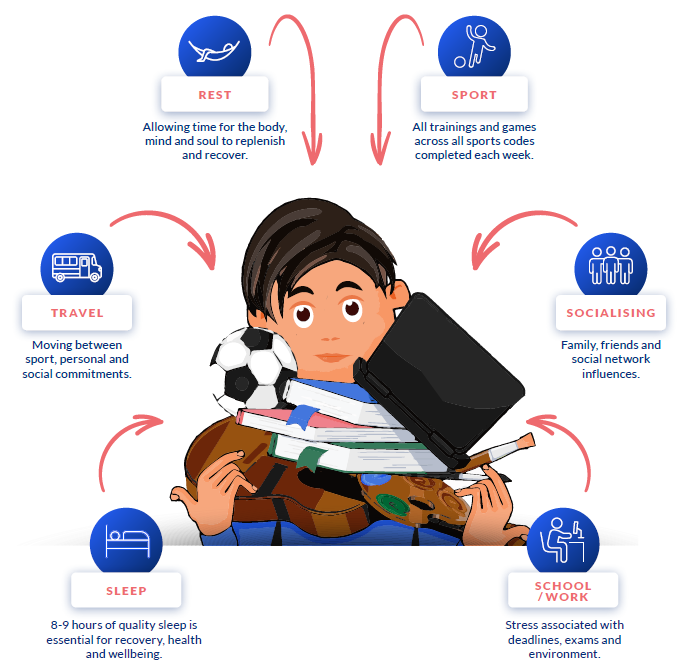Managing Load
Learn how to best prepare for your sessions and matches, improve strength, speed, and stamina, ensuring your development and physical performance is at your best every week.
What is load?
Load is all the internal and external stress factors that are placed upon your body.
Load = The amount of stress placed on the player both internally and externally.
Stress = A state of physical, mental, or emotional strain or tension resulting from adverse or demanding circumstances.

So how do we monitor and manage a player’s load?
Monitoring players is essential to define the relationship between the amount of stress that’s been placed on the body, and the risk of injury.
Some simple examples could include:
- Tracking training and playing minutes.
- Measuring RPE at each session/match (Rate of perceived exertion)
- Recognising when school exams and work deadlines are coming up and comparing RPE at this time.
- Sleep (quality and duration).
- Tracking a daily mood score (amazing, good, meh, bad, awful).
Signs and symptoms of overtraining/overload:
- Persistent injuries and niggles
- Fatigue and tiredness
- Reduced appetite and weight loss
- Irritability and agitation
- Decline in performance
- Sessions and workouts constantly feel challenging
- Disturbed sleep
- Decreased immunity or illness
- Loss of motivation
Top Tips To Manage Load
So, what do you do if you’re feeling fatigued or any of the above or find that the measures you’ve put in place are showing a spike in results? Here are a few tips to help you navigate through what to do when something doesn’t feel right:
- Talk with your coach, parent, teacher, friend. These people can work with you to establish personalized guidelines for your recovery and training schedule.
- Rest – Ease off any extra training. You need at least one complete day of rest every week.
- Take some time to socialise or do something for yourself (go for a surf, go shopping, chill out with mates, get your nails done)
Control the controllables:
- Your nutrition and calorie intake should cover what your body needs for training and muscle repair.
- Dehydration contributes to muscle fatigue. Ensure adequate fluids with the goal of having light-coloured urine.
- Get a minimum of 8-9 hours quality sleep every night.
- Ensure you’re having a rest day or add an additional rest day into your schedule.
To find more useful information for players, check out our list of player resources.

 Admin Login
Admin Login